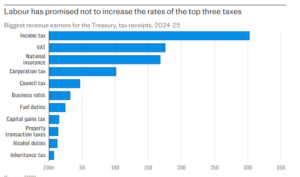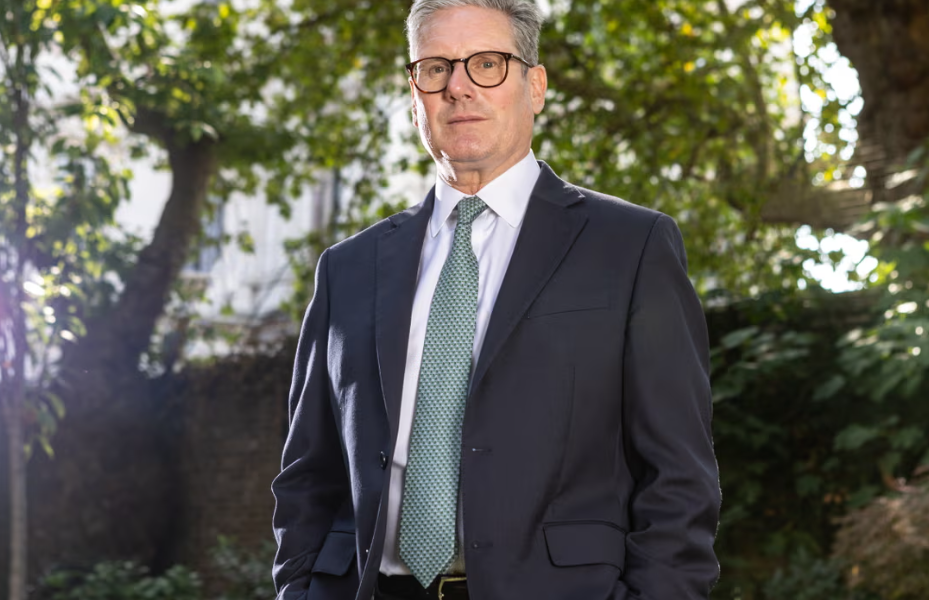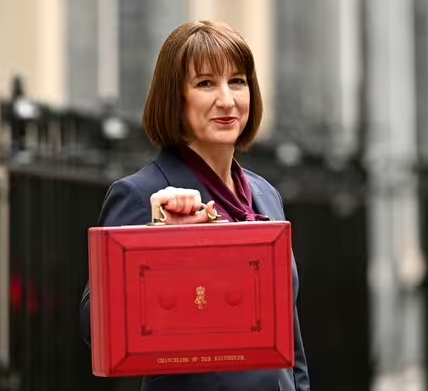Starmer’s plan to turbocharge growth has fallen flat, says founder of Everton kit maker! B
Castore boss Tom Beahon says start-ups are second-guessing Britain’s status as a global investment hub under threat of higher taxes

A capital gains tax raid would undermine Sir Keir Starmer’s bid to make Britain the fastest-growing economy in the G7, the boss of one of the country’s most promising start-ups has warned.
Thomas Beahon, co-founder of sportswear manufacturer Castore, has said the Prime Minister’s plans to turbocharge growth have so far fallen flat as he urged Sir Keir and Rachel Reeves, the Chancellor, to change tack ahead of the Budget.
Mr Beahon urged the Government not to impose higher taxes on wealth and warned ministers that “government overreach” on workers’ rights could damage the economy.
“Clearly, there has been a lot of talk at the moment around the capital gains tax,” he said. “I am far from an expert but I struggle to see how that aligns with a stated governance strategy [of] wanting to give us the fastest growth in the G7.
“I often feel there is a misconception that capital gains are paid by people who all live in stately homes who haven’t worked for 20 years and inherited their wealth.
“But it is often an entrepreneur who started a business or it might be a small entrepreneur that served its local community for many years. For the Government to increase capital gains on that person doesn’t seem fair.”
The comments come after Sir Keir warned in a speech last month that October’s Budget would be “painful”, adding: “Those with the broadest shoulders should bear the heavier burden.”
Ms Reeves has also said taxes will have to rise in the autumn. Labour ruled out tax rises on working people in its election manifesto but has refused to rule out targeting wealth through taxes such as capital gains and inheritance.

While recognising that Labour is yet to reach 100 days in power, Mr Beahon said he had “not seen a huge amount of commitment to growth, to entrepreneurialism or innovators”.
He said: “Any fair-minded person understands that our country’s finances are not in great shape and there’s always going to be difficult decisions to make. But through making them, the Government has a chance to set its stall out.
“As we go into this Budget [next month], Rachel Reeves has a big opportunity to demonstrate that she’s on the side of business. They have a chance to demonstrate that and put their money where their mouth is. The Budget is the catalyst where they have this opportunity.”
Mr Beahon co-founded Castore from the Wirral in 2015 and has grown the business to a valuation of nearly £1bn. He was formerly a member of Rishi Sunak’s 2024 business council, signifying his stature as one of the country’s leading entrepreneurs.
Mr Beahon’s comments will serve as a warning to Sir Keir ahead of the Labour conference, which kicks off in Liverpool on Sunday. It also comes after the Resolution Foundation, a Left-leaning think tank, last week concluded that Sir Keir will only get halfway to his target of making Britain the fastest growing economy on a sustained basis in the G7.
Mr Beahon launched Castore with his brother Phil, initially funding the business with a £25,000 loan from their parents.
The company has since attracted a deep-pocketed pool of investors that includes the billionaire Issa brothers and America’s Raine Group.
Mr Beahon said he has adopted an attitude of “grow or die”, expanding by striking a series of audacious kit and sponsorship deals with sports teams and athletes who are often neglected by larger rivals.
Its stable of teams now includes Bayer Leverkusen, Everton, Rangers and the England cricket team. It also sponsors individual sports stars such as boxer Joe Joyce and had a prominent deal with Andy Murray. Castore sells 10m football kits a year.

Their rapid success has since thrust the Beahon brothers, who remain Castore’s largest shareholders, into the world of venture capital. It is through this network that Mr Beahon has encountered fears about Britain’s status as a global investment hub, particularly given the threat of higher taxes under Labour.
“There are a lot of positive things happening in the UK,” he said. “But I do hear a lot of people genuinely talking about, ‘Is the UK the right place to be?’
“If you have a more punitive tax regime and a government that certainly thus far seems to be focusing on other priorities rather than business and wealth creation, then at some point I definitely get the sense that entrepreneurs will say, ‘Can I run my business in another country?”
This perception is reflected in the fact that Castore has yet to list on the London Stock Exchange, choosing to keep the business private instead of confronting the constraints of the public markets.
Mr Beahon said he felt staying private has given the company a recent edge over rivals such as Nike, which has been forced to appease investors amid a recent slump in its share price.
“Nike is one of the best-known brands in the world but its share price has had a difficult year, and you see them reacting accordingly,” he said. “We don’t have that pressure.
“If you’re asking me, if we were to list the business tomorrow morning and would that be a net benefit for the business, I couldn’t hand-on-heart say it would be.”
He added: “Equally, nothing would make me more proud than starting a business in the UK, growing it internationally from a UK headquarters and then listing on the LSE.”
Castore’s rapid ascent has been accompanied by growing pains, which have largely revolved around the quality of the company’s Premier League football kits.
This includes Aston Villa’s “wet-look” shirt fiasco last season, which prompted complaints from players who said sweat-soaked Castore jerseys affected performance.

Mr Beahon downplayed the seriousness of the historical issue and suggested the matter had been blown out of proportion because of the industry in which Castore operates.
“The nature of selling football kits over pens and widgets is that those kind of issues are publicised,” he said.
He insisted Castore was now in a “very different position to what it was 12 to 18 months ago”, stressing that the business had used recent investment to improve its supply chain and infrastructure. The company raised £150m last November.
Castore is now targeting expansion overseas, including growing beyond its current 20 shops.

Mr Beahon said he wanted Castore to become the number one sports brand in Britain and has ambitions to compete with Nike, Adidas and Puma around the world. Unsurprisingly, this has led to potential takeover inquiries, although Mr Beahon was adamant that he wants to build a UK brand that competes on the global stage.
“I am not sure you achieve that vision by selling out to a big guy,” he said.
This British ambition could be something Sir Keir takes note of as he speaks before the Labour conference this week. Many – Mr Beahon included – hope the Prime Minister will ditch his gloomy rhetoric about the state of the economy in favour of optimism around the country’s potential.
“As a leader, your job is to inspire people, to create a vision,” Mr Beahon said. “If as a leader, you just point out how hard it is then people are not going to be inspired.
“We absolutely do need a vision. What does the future look like, according to Starmer? And what is his view about a better Britain? We haven’t seen that yet.”


